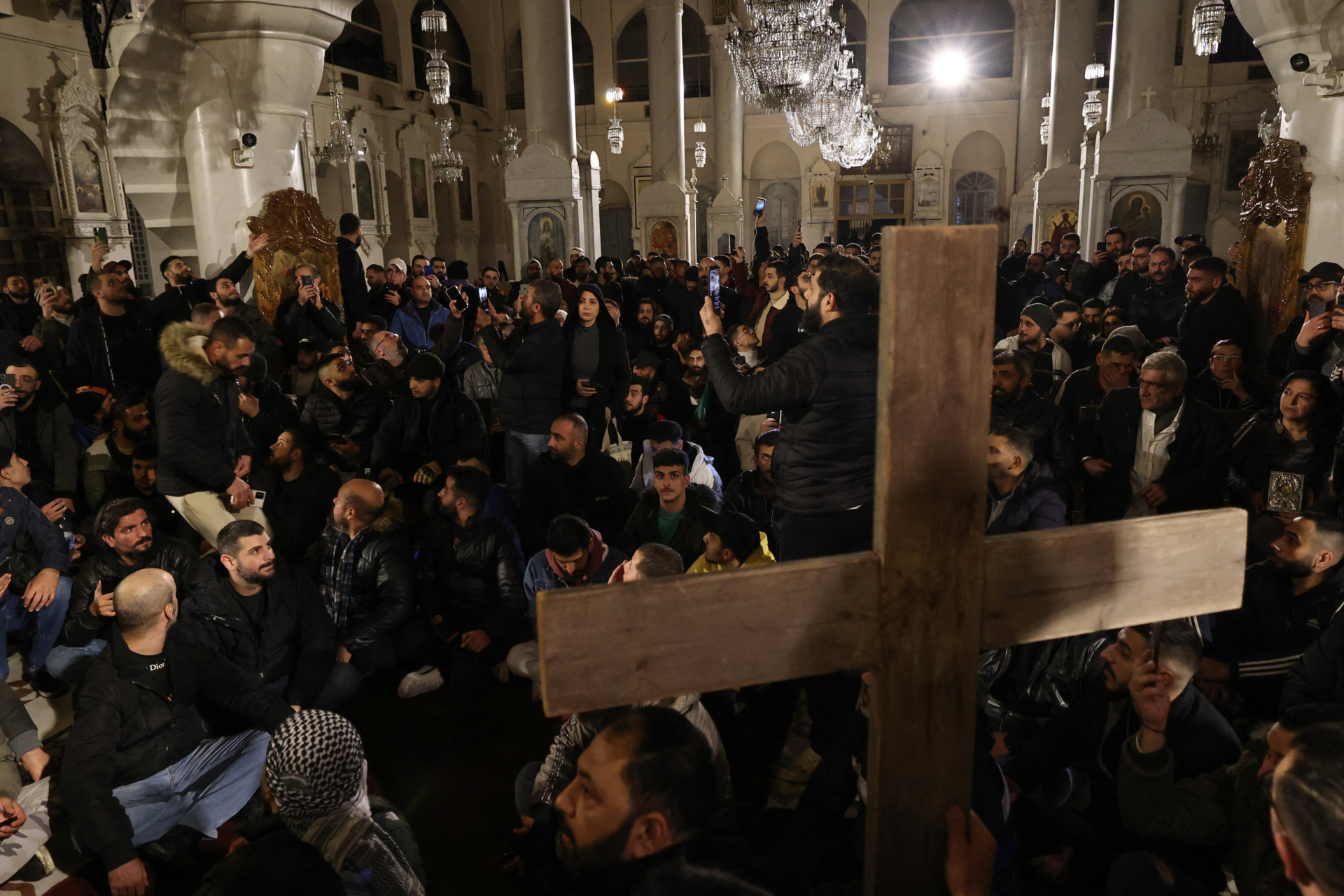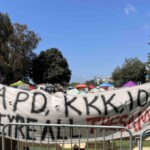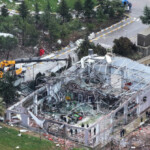Hundreds of Christians marched through the streets of Damascus on Tuesday to protest the burning of a Christmas tree in a village in central Syria.
Christians have been highly skeptical of promises to protect all religious minorities made by the Islamist rebel leaders who overthrew dictator Bashar Assad.
The protests were sparked by a social media video of hooded men setting fire to a Christmas tree in the Christian town of Suqaylabiyah, located near Hama in central Syria.
The Islamist group that led the drive to overthrow dictator Bashar Assad earlier this month, Hayat Tahrir al-Sham (HTS), told Suquaylabiyah residents the fighters who burned the Christmas tree were “not Syrians.”
HTS representatives said the vandals would be caught and punished, and the Christmas tree would be restored. The BBC cited reports that the HTS emissary held up a cross to demonstrate respect for residents of the Christian town.
The London-based Syrian Observatory for Human Rights (SOHR) reported the vandals were indeed foreigners, members of a minor Islamist rebel group called Ansar al-Tawhid. The group was formed in 2018 from the remnants of an ISIS-aligned group called Jund al-Aqsa that fought with HTS, itself the rebranded Syrian franchise of the Islamic State’s rivals in al-Qaeda.
HTS ultimately defeated and absorbed Ansar al-Tawhid into its ranks. During its brief years as an independent entity, the ideology of Ansar al-Tawhid leaned toward al-Qaeda, and the group was often accused of being an al-Qaeda proxy.
Local Syrian media claimed the hooded men who set fire to the Christmas tree were Uzbek militants recruited into Ansar al-Tawhid’s ranks.
Syrian Christians did not trust the reassurances from HTS, so they marched in Damascus early Tuesday to demand protection and equal rights from the new regime.
“If we’re not allowed to live our Christian faith in our country, as we used to, then we don’t belong here anymore,” one of the demonstrators told Agence France-Presse (AFP).
One group of protesters marching through the Kassa neighborhood of Damascus called on HTS to expel all foreign fighters from Syria. “Syria is free! Non-Syrians should leave!” they chanted.
“We will sacrifice our souls for our cross,” chanted another group walking through the Bab Touma district.
The Christmas tree burning galvanized anxieties among Syria’s Christian community, which became much smaller during the long civil war as ISIS and other Islamist groups killed Christians and drove them from their homes. Entire villages were systematically wiped out by groups aligned with both the Islamic State and al-Qaeda.
Many Christians feared the victorious jihadi rebels would turn on them because they were perceived as supporters of the Assad regime. Assad was known for extending some degree of protection to Christians in exchange for their political backing.
A week before the Christmas tree burning, unknown gunmen shot up a Greek Orthodox church in Hama, smashed headstones in its cemetery, and tried to steal its cross. Syrian Islamist groups drove through Christian neighborhoods in Damascus blasting jihadi propaganda from loudspeakers, and posted threats to finish off Syria’s Christian community on social media.

Christian youths stage a sit-in inside the Mariamite Church in Damascus early on December 24, 2024. Hundreds of demonstrators took to the streets in Christian areas of Damascus early on December 24, to protest the burning of a Christmas tree near Hama in central Syria, AFP journalists witnessed. (ANWAR AMRO/AFP via Getty Images)
Protesters also claimed Christian property has been stolen or vandalized in Christian towns and Christian districts of cities such as Hama and Damascus.
“The community is watching to see if the groups currently in power are genuinely committed to establishing a civil society that offers equal opportunities for all,” Bishop Andrew Bahhi of St. George’s Syriac Orthodox Church told Reuters on Monday.
Bahhi gave HTS credit for acting quickly to stop an unknown group that was driving an armored vehicle through the Christian district of Bab Touma in Damascus with a threatening message written on the windshield, but he said the city’s Christians remained nervous at the sight of heavily armed Islamists walking their streets. Many of those fighters are likely loyal to jihadi groups that committed atrocities against Christians during the civil war.
“The ideology does not change in an hour,” a Syrian Christian woman told Reuters.
According to the Middle East Media Research Institute (MEMRI), the Christmas tree in Suqaylabiyah was restored on Tuesday evening and relit with great ceremony:
CNN reported on Tuesday the HTS-led government has designated Wednesday and Thursday as public holidays, and it has not imposed any official limits on Christmas celebrations.
“Hayat Tahrir al-Sham have not announced anything on stopping our celebrations… but there are Christians who don’t want to go out to celebrate because they fear that they might get attacked from rogue armed individuals,” a Damascus resident named George told CNN.
“It will make a big difference if there are announcements on better security for Christmas. Until now there isn’t proper security that is 100% organized,” George added.
A common anxiety expressed by Syrian Christians is that HTS and its leader, former al-Qaeda boss Ahmed al-Sharaa, are only saying the right things about religious freedom to impress the international community during the early days of their takeover. As soon as the world’s attention wanders, the Islamist groups that now rule Syria could return to oppressing and purging Christians.


